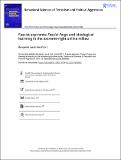Files in this item
Fascist aspirants : fascist forge and ideological learning in the extreme right online milieu
Item metadata
| dc.contributor.author | Lee, Benjamin | |
| dc.contributor.author | Knott, Kim | |
| dc.date.accessioned | 2021-01-12T12:16:07Z | |
| dc.date.available | 2021-01-12T12:16:07Z | |
| dc.date.issued | 2021-01-08 | |
| dc.identifier | 271302459 | |
| dc.identifier | 019ae735-24a6-4e93-ad28-d9dd572b02de | |
| dc.identifier | 85099292616 | |
| dc.identifier | 000606614200001 | |
| dc.identifier.citation | Lee , B & Knott , K 2021 , ' Fascist aspirants : fascist forge and ideological learning in the extreme right online milieu ' , Behavioral Sciences of Terrorism and Political Aggression , vol. Latest articles . https://doi.org/10.1080/19434472.2020.1850842 | en |
| dc.identifier.issn | 1943-4472 | |
| dc.identifier.uri | https://hdl.handle.net/10023/21263 | |
| dc.description | This work was supported by the Economic and Social Research Council, under Grant ES/N009614/1 (Centre for Research and Evidence on Security Threats) with funding from the UK Intelligence Community and participating universities. | en |
| dc.description.abstract | Learning in extremist settings is often treated as operational, with little regard to how aspiring participants in extremist settings engage with complex and abstract ideological material. This paper examines learning in the context of the amorphous network of digital channels that compose the extreme-right online milieu. Through an in-depth qualitative analysis, we explore how well the prevailing model of extremist ideological learning (in ‘communities of practice’) accounts for the behaviour of aspiring participants of Fascist Forge, a now-defunct extreme-right web forum. The findings suggest that some of the social aspects of communities of practice have been replicated in the online setting of Fascist Forge. However, for a combination of technical and ideological reasons, the more directed and nurturing aspects of learning have not. Several issues are raised about the role of ideological learning in online communities, notably the open accessibility of extremist material, the lack of ideological control leading to potential mutation and innovation by self-learners, and the role of digital learning in the preparation, shaping and recruitment of individuals for real world organising and activism. | |
| dc.format.extent | 25 | |
| dc.format.extent | 2063701 | |
| dc.language.iso | eng | |
| dc.relation.ispartof | Behavioral Sciences of Terrorism and Political Aggression | en |
| dc.subject | Extremism | en |
| dc.subject | Learning | en |
| dc.subject | Ideology | en |
| dc.subject | Extreme-right | en |
| dc.subject | Fascist Forge | en |
| dc.subject | Communities of practice | en |
| dc.subject | JZ International relations | en |
| dc.subject | 3rd-DAS | en |
| dc.subject | SDG 16 - Peace, Justice and Strong Institutions | en |
| dc.subject.lcc | JZ | en |
| dc.title | Fascist aspirants : fascist forge and ideological learning in the extreme right online milieu | en |
| dc.type | Journal article | en |
| dc.contributor.institution | University of St Andrews. School of International Relations | en |
| dc.identifier.doi | 10.1080/19434472.2020.1850842 | |
| dc.description.status | Peer reviewed | en |
This item appears in the following Collection(s)
Items in the St Andrews Research Repository are protected by copyright, with all rights reserved, unless otherwise indicated.

